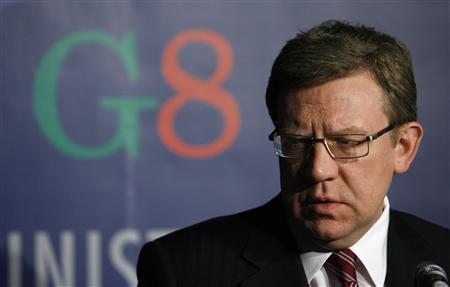
Russian Anti-Crisis Policy Is Adrift Without Direction
Publication: Eurasia Daily Monitor Volume: 6 Issue: 50
By:

Russia took part in two different economic forums last weekend where conflicting propositions for overcoming the global crisis were advanced. Moscow had little to contribute to any course. Finance ministers of the G20 gathered in Horsham, UK, to prepare the agenda for the summit of this "super-club" of leading economic powers, while OPEC held a meeting in Vienna aimed at reducing production quotas in order to push oil prices up. Consensus remained elusive at both gatherings as countries firmly put their parochial interests first, but Russia appeared unable to decide where its priorities really were.
The finance ministers disagreed about whether national stimulus packages or tight regulation and discipline offered the better chance to reverse the downturn, and the only point where Moscow took a meaningful stance was about reforming the International Monetary Fund and the World Bank, from which China stands to benefit but not necessarily Russia (www.gazeta.ru, www.rbc.ru, March 14). OPEC wanted a "demonstrative" reduction in oil production from Russia, but Moscow was reluctant to make any commitments, arguing that the spontaneous decline in its oil industry (amounting to only 0.7 percent in 2008) constituted a sufficient contribution to the efforts of the cartel, which it might contemplate joining (Vedomosti, March 13).
This dubiousness reflects the current lethargy in Russia’s anti-crisis policy, which was quite vigorous a few months ago, pumping money into the paralyzed banking system. This policy, however, has lost consistency and even a sense of purpose as the crisis has acquired the character of a multi-dimensional catastrophe. Finance Minister Alexei Kudrin is now suggesting that the budget deficit in 2009 might exceed the recently approved "optimistic" figure of 8 percent of GDP, but this vast over-spending does not include any targeted stimuli to particularly important sectors (www.newsru.com, March 14). Credit remains tightly restricted but social payments are being generously expanded, and inflation in fuel prices, which has reached 4.5 percent since the beginning of the year, appears certain to climb above the targeted figure of 13 to 14 percent (www.rbc.ru, March 12).
The anti-crisis plan designed by the government last autumn was based on the assumption that the accumulated financial reserves would cushion the impact of the recession, but it is now evident that no amount of money will help the state support production of goods that cannot be sold. Prime Minister Vladimir Putin tried to explain this last Friday to coal miners in Novokuznetsk, assuring them that things were "not that bad"; but the miners thought that a 65 percent decline in production and a 40 percent salary cut were very bad for them indeed (Kommersant, March 13). Economists now concur that the peak of the crisis will not come before 2010, but statistics show that the dynamics of contraction continues to accelerate, which means that Russia is set to hit a bottom of some kind fairly soon (Nezavisimaya gazeta, March 13).
The government has had to scrap the three-year budget approved with much fanfare last year and is now working on a new set of "realistic" guidelines that would only make sense if revenues from energy exports double from the current level (www.gazeta.ru, March 13). Vagit Alekperov, the owner of Lukoil, argues that $70-$90 per barrel would be a "fair" price for oil and would cover the steadily rising production costs and provide for investment in new projects, which have been slashed by every company including Gazprom (RIA-Novosti, March 12). What is hidden in these calculations are the greatly inflated operational and administrative costs in major Russian oil companies, which increased, for example, in state-owned Rosneft by as much as 25 percent in the last quarter of 2008 (Vedomosti, March 5).
Deputy Prime Minister Igor Sechin presented Russian ideas about "fairness" at the OPEC meeting, adding a vague promise to reduce exports by increasing domestic consumption; but support from Iran and Venezuela was not enough to shift the cautious position of Saudi Arabia, which is not happy that its own self-restrictions have made Russia the world’s largest oil producer (www.gazeta.ru, March 14). A great many ambitious "presidential" projects, from the total reconstruction of South Ossetia to the Olympic stadiums in Sochi, could only be accomplished by disbursing billions of "petro-rubles"; but Kudrin is now calculating the 2011 budget on the basis of medium to small revenues generated by oil prices at around $50 per barrel (Vedomosti, March 12).
President Dmitri Medvedev is trying to boost confidence in a bureaucracy disturbed by the shrinking of funds for distribution, emphasizing that "We have had almost no problems of a political nature of late," which reduces the chance of slipping into default (Kommersant, March 14). Financial default is indeed not among the most immediate risks, but an adverse political situation could turn out to be far less controllable than Medvedev and Putin preach. A government that is demonstratively unable to provide support for the energy sector, to economize on investments, to put state finances in order while wasting hundreds of billions of dollars rescuing "friendly" oligarchs, or to check the escalating unemployment cannot expect that its life cycle will last long. Social protest may be slow in gathering; but the disappointed elites, further irritated by the Kremlin’s making scapegoats of ineffectual governors and the "wrong kind of entrepreneurs," might be tempted to act preemptively.
Various triggers are clicking perilously close to the political powder kegs these days, ranging from a near-mutiny in Berdsk caused by the disbanding of a Spetsnaz brigade to the charged campaign for mayor of Sochi, where the charismatic anti-Putinist Boris Nemtsov is a contender (Ezhednevny zhurnal, March 12). What could constitute a real detonator, however, is the trial of Mikhail Khodorkovsky and Platon Lebedev, which has opened in Moscow and enjoys massive media coverage (Moskovskiy komsomolets, March 14). Despite extensive efforts by the prosecution, the lack of substance in the sloppily prepared case is impossible to hide, and this constitutes a clear dilemma for Medvedev. A guilty verdict would implicate him in a gross distortion of justice, but allowing the case to fall apart in the court would constitute a direct challenge to Putin and his lackeys, who have benefited from dismembering Yukos. Medvedev would have to feel desperate to contemplate the latter option…but then, perhaps he already does.




